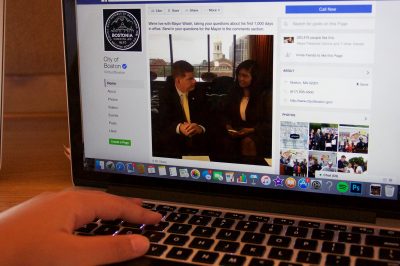
To commemorate Saturday being his 1,000th day in office, Boston Mayor Martin Walsh held a live Facebook chat on Friday to answer questions from residents as well as discuss an array of initiatives his office is working on.
In the approximately 30-minute Facebook Live video chat, Walsh concentrated on Boston initiatives and issues, such as the opioid epidemic, relations between police and community, employment, education and affordable housing. Gabrielle Farrell, the spokesperson for Boston Public Schools read questions from the Facebook comment section as well as asked her own questions to Walsh.
Walsh said during the chat that he enjoys “doing something different” in his mayoral duties.
“This is the first time in the history of Boston that a mayor’s had a Facebook Live chat; so we made history today,” Walsh said. “I love spending time out with the community out in the public.”
To answer a question regarding Walsh’s Democratic National Convention speech about his alcohol addiction recovery and how to find help in Boston, Walsh stressed the importance of asking for help and calling Boston’s recovery hotline.
“Call 311; make that phone call,” Walsh said during the chat. “When I went into detox, I thought my life was over, and I had no idea that it was really just beginning … Take it a day at a time.”
When asked about his stance on the legalization of marijuana, Walsh said he does not support it in Massachusetts. Question 4 on the Massachusetts ballot in November will let voters decide whether to legalize marijuana in the Commonwealth.
“I’m not for it; I’ve been very clear on that,” Walsh said “Creating a marijuana industry in Massachusetts is not the way to go. I know there are a folks out there who smoke marijuana that doesn’t affect them, but there are a lot of folks out there that do smoke it does affect them.”
Aside from elaborating on city issues, Walsh also provided an inside look into his mayoral life. Walsh said during the Facebook Live event that the “demand on [his] schedule is insane.”
“With Twitter and with all the new technology — there is such a competition in the media world to break a story,” Walsh said, answering a question from Farrell. “So they’re constantly asking and looking for new information … Now, it’s a 24-hour news cycle.”
When Farrell asked about what Walsh’s plans are for his next 1,000 days, Walsh said the ground work he and his office have made during the first 1,000 days will help with upcoming projects and initiatives.
“Now we are going from a planning stage to an implementation stage,” Walsh said during the live chat. “Seeing the results of what we have been doing and the return on investment. That’s a big piece … we are continuing to plan, but now it’s about really getting into the weeds here and making some significant changes.”
Several Boston residents said there is much room for improvement in Boston, but the mayor has done a decent job.
Jamaal Simmons, 35 of Roxbury, said he has yet to witness a lasting impact from Walsh’s work, as Simmons has spent much of his life under former Boston Mayor Thomas Menino’s leadership.
“I don’t want to put too much pressure on the guy,” he said. “No matter how great the city gets, there’s always room for improvement.”
Robert Duncan, 53, of the South End, said he is satisfied with the mayor’s performance, as Walsh has been putting in effort to reinvigorate underperforming neighborhoods.
“Boston seems to be booming right now,” he said. “There’s a lot of building being built … It looks like he’s cleaning up some of the bad areas.”
Nathan Smith, 29, of Brighton, said the mayor has been performing well amid much criticism.
“He does a great job of knowing when his opinion is not the popular one but defending it and justifying it anyway,” he said. “He’s really against new taxes. I know a lot of people in the city would be OK with things being more expensive, like say, pulling the T out of the gutter, and some more issues.”
Breanne Kovatch and Alana Levene contributed to the reporting of this article.






















































































































